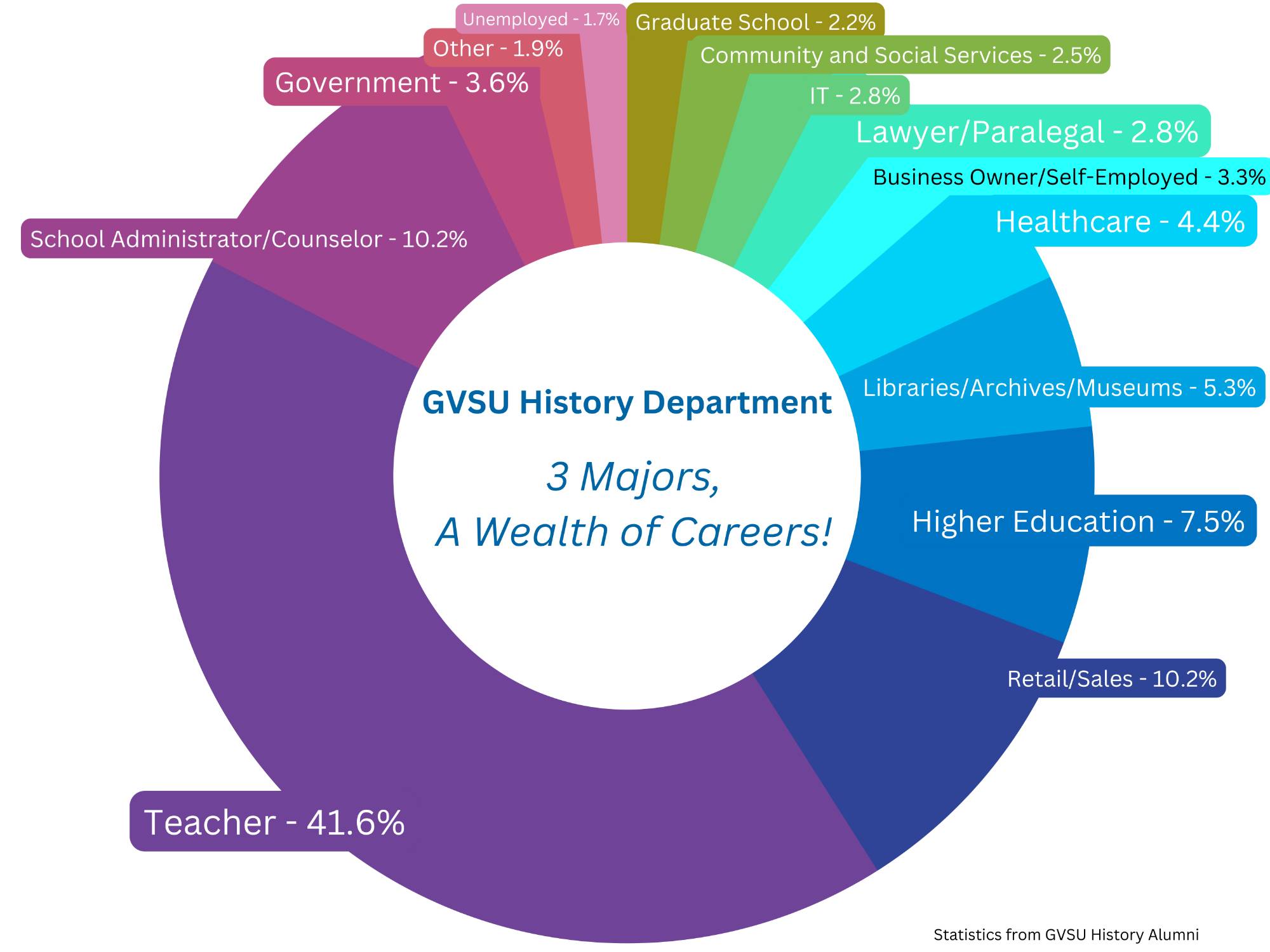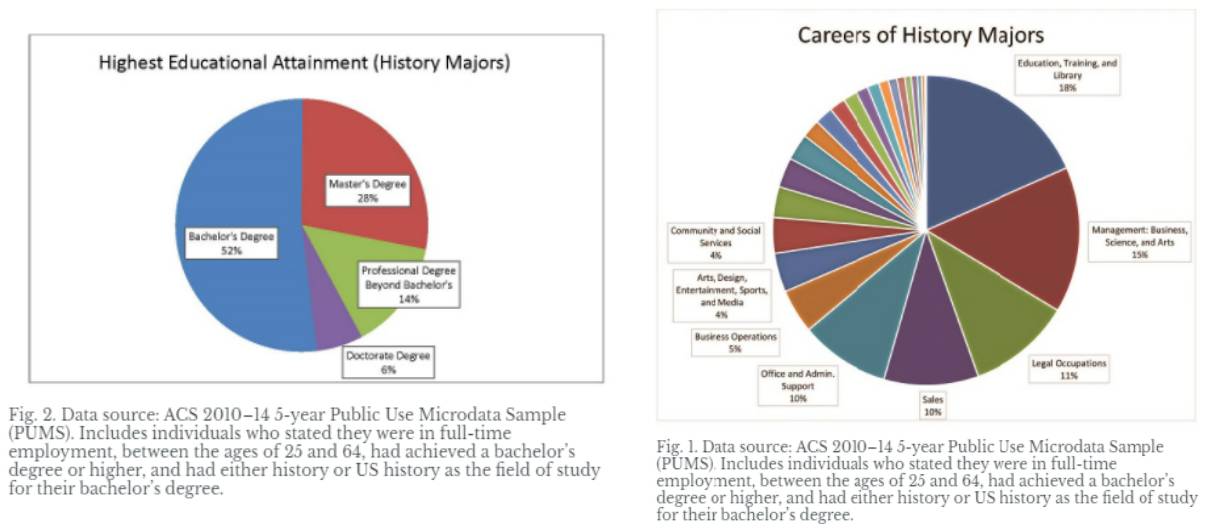Career Resources

What Can I Do with a History Major?
The short answer to this question is “everything.” The history major has many career options because prepared with skills in demand in many fields, including writing, research and problem solving, critical thinking, and oral communication. Moreover, these skills are transferrable—they are not field-specific but applicable in many ways for many different kinds of jobs.
Many employers look at the college degree, not the specific major, and make their decisions about whom to hire based on which applicants best show that they understand the job, have the skills that will help their future employer, and possess a desire to work hard and succeed.
When you graduate and look for a career, know your interests (a visit to the Career Center is highly recommended: https://www.gvsu.edu/careers/), know the skills you have gained, and think ahead by taking advantage of opportunities such as internships or career preparation events that will help you in the future.
For further information, see:
American Historical Association, “Why Study History?” https://www.historians.org/teaching-and-learning/why-study-history
American Historical Association, “Careers for History Majors” https://www.historians.org/jobs-and-professional-development/career-resources/careers-for-history-majors
GVSU History Major https://www.gvsu.edu/cms4/asset/8E60AE8A-DD89-F38B-68F611A92AA5D47A/history_general_15-16.pdf
U.S. Bureau of Labor Statistics, Occupational Employment Statistics https://www.bls.gov/oes/current/oes_stru.htm
U.S. Bureau of Labor Statistics, Employment Projections https://www.bls.gov/emp/
FOR MORE INFORMATION ON CAREER POSSIBILITIES, CLICK HERE OR SEE BELOW
The Options
Career Resources: The Options
Job Titles
- Lawyer
- Legislative aide
- Foreign Service
- Law enforcement
- Public advocacy groups
- Public office, staff administration, or campaign assistant
- Legal aid or public defender’s office
- Community organizing
- Paralegal
Preparation Strategies
- Complete an internship at a government agency or public policy group
- Join Law Society of GVSU
- Seek leadership roles in campus organizations, including student government
- Join debate teams
- Volunteer for community organizations, advocacy groups, or political parties
- Complete a study abroad program
Resources
- GVSU Pre-law Website
- American Bar Association, Legal Profession Statistics
- What Can I Do with This Major?
Potential Employers
- Law firms
- Federal, state, and city government
- Lobbying organizations
- Corporations
- Non-governmental organizations (NGOs)
- Public interest groups
Curriculum Suggestions:
BUS 201: Legal Environment for Business
CJ 302: Criminal Law
CJ 305: Constitutional Rights and Civil
Liberties
CJ 325: Criminal Justice and Human Rights
CJ/LS 444: Forensic Behavior and Law
CLA 367: Thinking Like a
(Roman) Lawyer
COM 303: Debate
HST 317: History of American Foreign Relations
HST 328: U.S.
Constitutional and Legal History
LS 201: Introduction to Law
LS 324: Legal Research and Writing
MGT 334: Labor and Employment Law
MGT 432: Grievance
Arbitration and Collective Bargaining
PHI 330: Legal
Philosophy
PLS 206: American Constitutional Foundations
PLS 306: Constitutional Law I (Federalism and Separation of
Powers)
PLS 307: Constitutional Law II (Civil Rights and
Liberties)
PLS 314: International Law
WGS/LS 370: Women and
the Law
For more curriculum suggestions, see http://www.gvsu.edu/polisci/pre-law-faq-45.htm
Students interested in becoming a lawyer will need to attend law school (earning a J.D.) (http://www.lsac.org/jd/), which requires taking the LSAT (http://www.lsac.org/)
Job Titles
- CEO
- Entrepreneur
- Accounts manager
- Systems analyst
- Business manager
Preparation Strategies
- Attend professional and career events sponsored by GVSU Career Center, including Job Fair
- Gain relevant experience through internships and summer jobs
- Join student organizations for business students
- Talk to professionals in industry that interests you
Resources
- What Can I Do with This Major? http://whatcanidowiththismajor.com/major/business-studies/
- Seidman College of Business, Student Organizations: http://www.gvsu.edu/seidman/student-organizations-70.htm
Potential Employers
- Manufacturers
- Healthcare organizations
- Banks and financial institutions
- Real estate brokers
- Insurance companies
- Retail stores
- Hotels and restaurants
- Nonprofit management
Curriculum Suggestions
Interest in General Business:
ACC 212: Principles of Financial Accounting
ACC 213: Principles
of Managerial Accounting
ECO 210: Introductory Macroeconomics
ECO 211: Introductory Microeconomics
BUS 201: Legal Environment for Business
Interest in Marketing:
ACC 212: Principles of Financial Accounting
ECO 211: Introductory Microeconomics
BUS 201: Legal Environment for Business
MKT 350: Marketing Management
Interest in Management:
ACC 212: Principles of Financial Accounting
ECO 211: Introductory Microeconomics
BUS 201: Legal Environment for Business
MGT 331: Concepts of Management
FIN 320: Managerial Finance
Alternately, history majors could complete the 12-credit Entrepreneurship Certificate offered by Seidman College of Business, which is designed as “a short track of courses to learn the process and tools, and to develop the skills and experiences necessary to identify and create a sustainable business opportunity.” See https://www.gvsu.edu/catalog/2014-2015/program-view.htm?programId=10DDD75C-AE4C-AA32-20DEDAAA01C9176B
Job Titles
- Elementary and secondary school teacher
- School administrator
- College professor
- Higher education administrator
- Higher education student support services
Preparation Strategies
- Volunteer in schools (25 hours of experience with children or youth required by College of Education for admission)
- Seek experience with youth, such as summer jobs at camps, churches, or youth organizations
- Complete a relevant internship, for example, at a literacy center
- Complete a study abroad program
- Complete a senior thesis (HST 498) if considering graduate school
Resources
- History Major with Secondary Education http://www.gvsu.edu/cms4/asset/8E60AE8A-DD89-F38B-68F611A92AA5D47A/history_secondary_education_15-16.pdf
- GVSU Elementary Education Major http://www.gvsu.edu/coe/undergraduate/undergraduate-elementary-education-program-25.htm
- GVSU College of Education, Admission Requirements http://www.gvsu.edu/coe/undergraduate/admissions-requirements-10.htm
- What Can I Do with This Major? http://whatcanidowiththismajor.com/major/education/
- American History Association, “Graduate School Application Process: From Start to Finish” https://secure.historians.org/projects/cge/PhD/Questions.cfm
Potential Employers
- K-12 schools
- School districts
- Community colleges
- Colleges and universities
Curriculum Suggestions
EDF 315: Diverse Perspectives on Education
EDI 337: Introduction to Learning and Assessment
EDT 370: Technology in Education
PYS 301: Child Development
SST 309: Social Studies for Elementary Teacher (for elementary
teaching minor)
SST 310: Strategies for Social Studies Teachers
(for secondary teaching certification)
HST 498: Senior Thesis (if considering graduate school)
Students interested in elementary school teaching can major in Social Studies and must complete the Elementary Education Minor
Students interested in college teaching will need to earn a graduate degree in history (Ph.D.). All students considering graduate study should major or minor in the foreign language(s) relevant to their interests
Job Titles
- Government historian
- Museum Curator
- Cultural resource manager
- Conservator
- Park service historian
- Historical consulting
- Historic preservation specialist
- Archivist or records manager
Preparation Strategies
- Complete an internship in public history
- Volunteer at local museums, historical societies or other organizations relevant to public history
- Complete a study abroad program
- Complete a senior thesis (HST 498) if considering graduate school
Resources
- American Historical Association, Careers in Public History https://www.historians.org/jobs-and-professional-development/career-resources/careers-in-public-history
- National Council on Public History, Job Listings http://ncph.org/jobs
- The Public History Navigator http://ncph.org/wp-content/uploads/The-Public-History-Navigator-2015-Web.pdf
- Melissa Bingmann, “Advising Undergraduates about Career Opportunities in Public History,” Perspectives on History (March 2009) https://www.historians.org/publications-and-directories/perspectives-on-history/march-2009/advising-undergraduates-about-career-opportunities-in-public-history
- American Association for State and Local History
- American Alliance of Museums http://www.aam-us.org/resources/careers
- Society of American Archivists http://careers.archivists.org/
Potential Employers
- Museums
- Historical societies
- Federal, state, and local government
- Nonprofit organizations
- Corporations
- National Park Service
Curriculum Suggestions
ANT 220: Introduction to Archaeology
ANT 314: Bioarchaeology
HST 405: Local and Community History
HST 420: Public History*
HST/CLA 415: Museum Studies*
HST 490: History Internship
Students interested in careers in public history often obtain a master’s degree (MS or MA) in history or museum studies
Job Titles
- Academic librarian
- Services librarian
- Liaison librarian
- Metadata librarian
- Library director or manager
- Health science librarians
- Archivist
- Conservator
- Children’s or young adult librarian
Preparation Strategies
- Volunteer at a public or school library
- Gain relevant experience through part-time jobs in libraries
- Seek experience with youth, such as summer jobs at camps, churches, or youth organizations (for school librarians)
Resources
- American Library Association, “LibraryCareers.org” http://www.ala.org/educationcareers/libcareers
- Meredith Schwartz, “How to Become a 21st Century Librarian,” Library Journal, March 20,
- 2013 http://lj.libraryjournal.com/2013/03/careers/how-to-become-a-21st-century-librarian/#_
Potential Employers
- Public libraries
- Academic libraries
- School libraries
- Corporations
- Government (including National Archives and Records Administration)
Curriculum Suggestions
CIS 160: Programming with Visual Basic
CIS 238: Internet Media
and Programming
COM 201: Speech
COM 371: Media and Society
If interested in children’s or young adult librarianship:
ENG 304: International Literature for Children and Young Adults
ENG 309: Teaching Literature to Children
ENG 311: Teaching
Literature to Adolescents
ENG 334: American Multicultural
Literature for Children and Adults
A strong liberal arts background is the best preparation for a librarian.
Most professional-level library positions require a master’s degree in library and information science (either MLS, MLIS, MSIS, MSLS, MA in LIS, or MS in LIS)
Job Titles
- Journalist
- Editor at trade or university press
- Editor at newspaper, website, or magazine
- Publisher
- Documentary film producer
- Grant or technical writer
- Media planning
- Media relations specialist
Preparation Strategies
- Gain relevant experience through internships and summer jobs
- Seek leadership roles in campus organizations, including student programming
- Work for campus newspaper, radio station, and similar outlets
- Volunteer to be announcer at college and local sporting events
- Volunteer to create or maintain websites for local organizations
- Maintain a personal website or blog to showcase work
Resources
Potential Employers
- Websites, newspapers, or magazines
- Radio and television stations
- Trade and academic presses
- Corporations
- Federal, state and local government
- Colleges and universities
Curriculum Suggestions
CFV 225: Film Culture
CIS 160: Programming with Visual Basic
CIS 238: Internet Media
and Programming
CMJ 236: News in Society
CMJ 256: News Reporting
CMJ 284:
Broadcast News 1
CMJ 290: Journalism History
COM 201: Speech
COM 220: Media Literacy
COM 271: History
of Communications Technologies
COM 371: Media and Society
ENG 261: Foundations of Language Study
LS 324: Legal Research and Writing
WRT 200: Introduction to Professional Writing
WRT 219:
Introduction to Creative Writing
WRT 253: Document Production and
Design
WRT 350: Business Writing
WRT 351: Writing for the
World Wide Web

